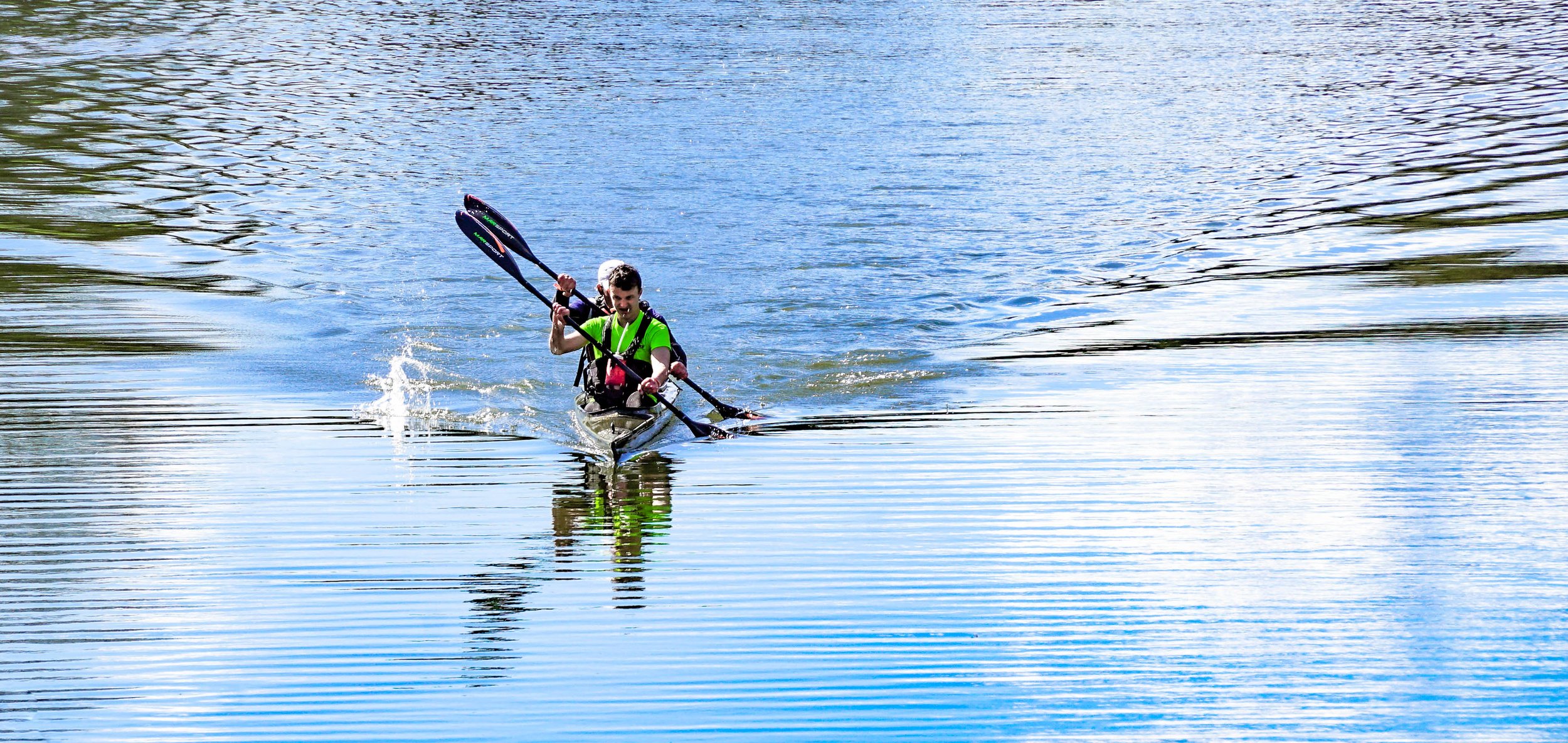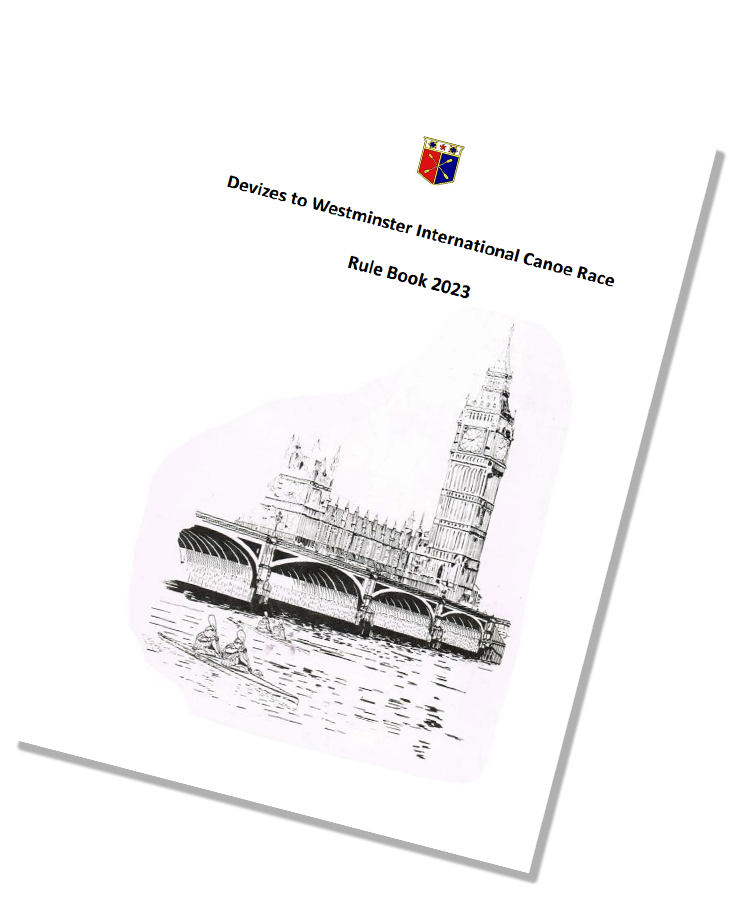Devizes to Westminster International
Canoe Race
Race Info & Rules
Photo: Julie Raworth
HandBook 2024
For comprehensive rules and information on DW Race, download our latest Rule Book.
Event Outline
The Devizes to Westminster International Canoe race (DW) is an ultra marathon that takes place every Easter weekend and is the longest non-stop canoe race in the world – it is often referred to as ‘The Canoeist’s Everest’. The first race was held in 1948 and with a few notable exceptions, has run every year since. Starting in Devizes in Wiltshire, the race travels down the Kennet and Avon Canal until it joins the River Thames at Reading, it then follows the River Thames to Westminster in the heart of London. The race is 125 miles long and includes 77 locks that need to be portaged. The race is run as a time-trial event, with Senior Double competitors choosing their start time to allow them to reach Teddington Lock for the ebb tide such that the last 17 miles of the race along the tideway is with both the tide and current. Most crews will complete the course in between 20 and 30 hours, but the fastest crews can often finish in under 17 hours….the current record for Senior Doubles is 15hrs 19mins 35secs.
There are 5 classes for the race….in either Kayak or Canoe.
Whilst the challenge has remained essentially the same since its inception in 1948, there have been several changes to the rules on safety grounds over the lifespan of the race. Notably paddlers no longer have to be self-sufficient for the race duration with bank-side support crews allowed to supply food and drinks to the competitors along the course as well as provide additional clothing should paddlers require it. Additionally, every competitor is fitted with a GPS tracker so that both race control and support crews can know exactly where the paddlers are at any time.
Event Date
Senior Doubles (non-stop) – Easter Saturday to Easter Sunday.
Stage Race Classes – Easter Friday to Easter Monday.
Event Start and Finish Points
Senior Doubles – Start at Devizes Wharf, Wiltshire. Finish at Westminster Bridge, London.
Stage Race Day 1 – Start at Devizes Wharf, Wiltshire. Finish at Northcroft Leisure Centre, Newbury.
Stage Race Day 2 – Start at Northcroft Leisure Centre, Newbury. Finish at Marlow Rugby Football Club Finish on LEFT 500m downstream of Longridge Activity Centre.
Stage Race Day 3 – Start at Marlow Rugby Football Club. Finish at Thames Young Mariners, Richmond.
Stage Race Day 4 – Start at Thames Young Mariners, Richmond. Finish at Westminster Bridge, London.
Event Timings
Because the finish of the race is on the tidal part of the Thames all paddlers will aim to finish on the ebb tide or slack water. Therefore, the finish window at Westminster changes each year dependent on the tide times at Easter. However, the following Westminster finish windows are typical in any given year.
Senior Doubles - Start times between 05:00 and 17:00 Easter Saturday.
Senior Doubles - Finish times between 05:30 and 15.00 Easter Sunday.
Stage Race Day 1 – Start times between 07:00 and 10:30 Easter Friday.
Stage Race Day 1 – Finish times between 14:00 and 18:00 Easter Friday.
Stage Race Day 2 – Start times between 06:45 and 10:00 Easter Saturday.
Stage Race Day 2 – Finish times between 13:00 and 18:00 Easter Saturday.
Stage Race Day 3 – Start times between 06:45 and 10:00 Easter Sunday.
Stage Race Day 3 – Finish times between 13:00 and 18:00 Easter Sunday.
Support Crews
All competitors are strongly advised to have support crews that follow them down the course, providing food, drink, spare clothing and replacement kit. All supporters are bound by the DW Supporters Code of Conduct and are briefed at the start of the race on the role of the support crew and any updates on the course and safety matters. Breaches of the Supporters Code of Conduct can result in a time penalty or disqualification of their racing crew. Support Crews of the stage races are limited to 2 supporters per paddler and 2 cars per boat, and the nominated supporters are issued with arm bands for identification purposes. Only these official supporters can service the paddlers during the race.
Control Centres
Race Control is centred at Wokingham Waterside Centre at Dreadnought Reach where key officials are located throughout the duration of the race. All crews’ progress is monitored via the GPS trackers, and incident management is controlled from here. There is also a Control Centre positioned at Westminster to cover safety on the tideway and manage the paddlers off the water and away from the South Embankment. The Westminster Control Centre is in VHF radio contact with the Safety RIBs/crews on the tideway.
Checkpoints
Checkpoints are placed at strategic locations along the course, approximately every 10 miles between Devizes and Teddington. These serve the function of a visual check that paddlers have passed the checkpoint, as well as allowing DW Officials to gauge the health and wellbeing of the paddlers along the route and make a decision if the crew should be allowed to continue. Certain checkpoints have a maximum elapsed time that crews must achieve and any crews that fail to make these times will have their number removed and be excluded from the race.
Marshals
Official Marshals are placed at nearly 40 locations along the course and their role is to assess the health and wellbeing of the paddlers, guide the paddlers through portages, ensure safe crossing of any roads and bridges, administer first aid where necessary, ensure the Rules of the race and Codes of Conduct are being followed and manage people and traffic congestion at specific pinch points of the course. Along the River Thames, Marshals are present at every lock except 2 (Temple and Cookham). All Marshals are briefed and trained before the event, and wear high visibility jackets whilst on course.
Traffic Control and Parking
The DW route passes through small villages and towns, and with support crews driving from one feeding or viewing point to the next there is potential for traffic and parking related issues along the course. To mitigate against this, Parking Marshals are deployed and are responsible for placing traffic cones and temporary signs at critical points along the course, preventing supporter’s cars being parked in close vicinity of bridges and on narrow country lanes running next to the canal. Where public car parks have limited spaces, the Marshals will monitor cars in and out to avoid gridlock. Parking guidance and general driving behaviour also form part of the Code of Conduct for Supporters.
First Aid Provision
Qualified First Aiders are positioned along the course, at various checkpoints and marshalling points as well as at the start and end of each daily stage on the 4-day event. A Paramedic is based at the finish control centre in Westminster, and an additional roving Paramedic can be directed to any location on the course if required. However, it is important to note that the guiding principle of the DW is that competitors and support crews are primarily responsible for their own safety. Therefore, if they are unable to deal with any situation, they will make use of the emergency services or take themselves to the nearest Accident and Emergency Department.
Toilet Facilities
It is generally expected that supporters will use public toilets along the route, but temporary toilets are provided at Devizes, Pewsey, Aldermaston, Dreadnought Reach, Old Windsor, Teddington, Thames Young Mariners and Westminster for use by both competitors and supporters. The rules state that paddlers or supporters are not allowed to relieve themselves in public and any such offence will result in a time penalty or disqualification.
Litter Disposal
The DW is a ‘no trace’ event and all participants are expected to take any litter home with them, not even putting it in public bins along the course. This is written into the rules and any participant (supporter or paddler) breaching this rule will risk disqualification of the crew.
Noise Control
The use of speakers, including mobile phones, by paddlers to play music in the boat during the race is prohibited. For support crews of the non-stop paddlers it is expected that all reasonable measures are taken to keep noise levels to an absolute minimum during the hours of darkness. This is stated in the supporters Code of Conduct.
Risk Assessments
Risk Assessments have been documented covering the hazards associated with the 3 different types of waterways that the paddlers will encounter – canal, river and tideway. Risk assessments have also been documented for the DW checkpoints and marshalling stations.
Emergency Response Plan
This is documented in the front of the Rule Book and all participants in the DW (competitors and supporters) are deemed to have read and understood it as a condition of entry.
Contingency Plans
A contingency plan for the race has been documented that covers the impact of water flow rates, water levels and weather conditions on specific locations along the course (such as low bridges and locks/weirs). This plan also covers under what conditions the race would be run under restrictions, such as no paddling in the dark on the River Thames, or elite crews only permitted on the course.
Charitable Status
The Devizes to Westminster Organisation Ltd is a Not-for-Profit Organisation although a race entry fee is charged to all competitors to cover the cost of running the event. Every year the DW Organisation nominates a charity to support and a significant number of entrants raise money for this, or other charities.
Insurance
The DW Organisation has Public Liability insurance cover up to £10M, Trustees Liability to cover the Organisation’s Directors and Officers and Employer’s Liability to cover volunteers who assist on the race operations (there are no paid employees).


